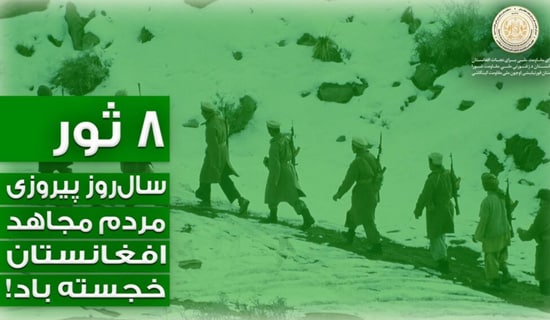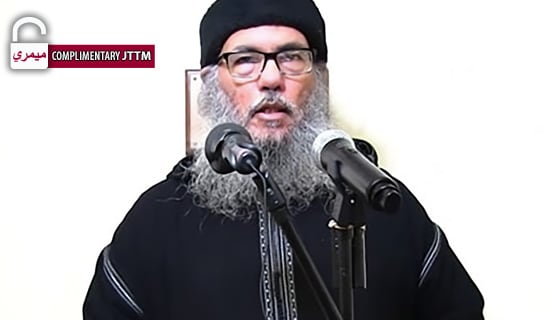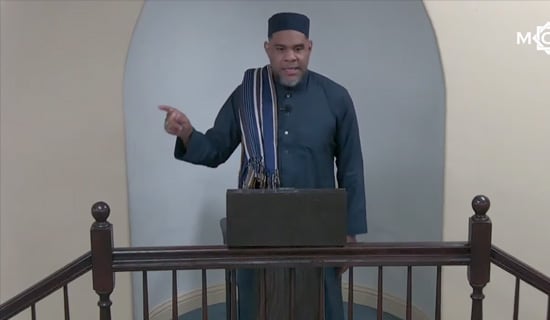
Indian security forces in Srinagar are confronted by stone-throwing Kashmiri youth (Image courtesy: greaterkashmir.com)
For more than a month, violent protests have been continuing in several districts of India's Jammu & Kashmir against human rights violations by Indian security forces. The new upsurge in protests, which began about six weeks ago, has its roots in the killing of a Kashmiri youth on January 31st. Now, more than a dozen Kashmiri youth have been killed during clashes with the Indian security forces in recent weeks. On July 7, the federal Indian government deployed troops in Srinagar, the summer capital of Jammu & Kashmir (J&K), the first such move in over 20 years.
The protest have created a law-and-order challenge for the government of Omar Abdullah, who succeeded Mehbooba Mufti as the Chief Minister of Jammu & Kashmir following the 2008 elections, which were boycotted by the secessionist groups' alliance All Parties Hurriyat Conference (APHC). On July 6, Abdullah, who has been recently working to engage grassroots groups in peace efforts, accused Pakistan of sabotaging the "quiet diplomacy" between the Indian authorities and the moderate faction of the APHC led by Mirwaiz Umer Farooq.[1] Indian Interior Minister P. Chidambaram has blamed the Pakistan-based militant group Lashkar-e-Taiba for the upsurge in violent protests.[2]Most of the militant organizations active in Jammu & Kashmir, including Lashkar-e-Taiba, Jaish-e-Muhammad and Hizbul Mujahideen – are supported from across the border in Pakistan.
In the first of the two interviews given below, which were published by Indian website rediff.com, Kashmir-based journalist Mukhtar Ahmad examines the causes of the current wave of violence in the Jammu & Kashmir state, while in the second interview secessionist Kashmiri leader Mirwaiz Umer Farooq explains how a way forward for peace can be found by the Indian government.
Senior Journalist on Unrest in Kashmir: "Civilian Protests Against What is Alleged to be Excessive Use of Force by the Paramilitary Personnel... Sustain a Vicious Cycle, During Which More Casualties Occur"
The following are excerpts from Mukhtar Ahmad's interview:[3]
Q: "Why is Kashmir burning?"
Ahmad: "There has been widespread violence in Kashmir in the last few days as separatist leaders continue to capitalize on the unrest among the youth in the state. The failure of the peace process between Center [i.e. federal government] and the separatist leadership, as also between New Delhi and Islamabad, to throw up any concrete solutions to the over six-decade long problem of Kashmir has generated a backlash among the local youth who often target police and paramilitary forces with rocks and stones."
Q: "What triggered the recent outburst?"
Ahmad: "The deaths of 14 teenagers and a youth since June 20 in firing by the Central Reserve Police Force [CRPF, or para-military force] and state police have triggered a cycle of violence in Kashmir. Civilian protests against what is alleged to be excessive use of force by the paramilitary personnel during clashes with stone pelters sustain a vicious cycle during which more casualties occur and violence continues to haunt the state."
Q: "When was the first civilian death reported this year?"
Ahmad: "The first civilian who was killed during this year was Whamiq Farooq, 13, who died on January 31, when protesters clashed with security forces in the Rajouri Kadal area of Srinagar [the summer capital of Jammu & Kashmir]."
Q: "If the incident occurred almost six months ago, why are the protests still going on?"
Ahmad: "The cycle of violence triggered by one civilian death results in protests during which more casualties occur, and the ball keeps on rolling..."
Q: "What are the Kashmiri people demanding?"
Ahmad: "The moderate All Parties Hurriyat Conference [APHC] has put forth demands that include removal of paramilitary bunkers and troops from all cities and major towns of the valley. They have also demanded the release of the youth arrested during clashes with the security forces and repeal of the controversial Armed Forces' Special Powers Act which gives sweeping powers to the deployed troops in the valley."
Q: "Everybody talks of a political solution to the problem – what is the solution envisaged?"
SUPPORT OUR WORK

Ahmad: "The separatists are demanding a political solution that satisfies the aspirations of Kashmiris through tripartite talks between India, Pakistan and the representatives of Kashmiris..."
Q: "What is J&K Chief Minister Omar Abdullah saying about this?"
Ahmad: "The chief minister has said the time has come when a political dialogue needs to be started between India and Pakistan and also between New Delhi and various shades of opinion in Kashmir to reach a sustainable solution to the problem. He also said that no amount of economic development and prosperity would ensure peace unless matched with a political initiative."
Q: "Is the task beyond Omar Abdullah?"
Ahmad: "The chief minister, who heads a coalition comprising his National Conference and the Congress, is fully backed by New Delhi to deal with the situation. The task is definitely not beyond Abdullah as long as he has Delhi's full backing to steer out of the present turmoil."
Q: "What is the state government doing about it?"
Ahmad: "Omar Abdullah had already started reaching out to the people through interactions with the civil society in violence-hit areas. He has held such interactions in Srinagar, Baramulla and Anantnag [districts]. The government is hopeful that these interactions would instill confidence among the people and help restore order in the Valley."
Secessionist Leader Mirwaiz Umer Farooq: "The Issue of Human Rights Violations has to Be Addressed; Another Important Thing that [India] ... Must do is to Restart Dialogue with the [Separatists]"
Following are excerpts from Mirwaiz Umer Farooq's interview:[4]
Q: "Do you think instead of calling for the army, Chief Minister Omar Abdullah should have formed an all-party peace committee to address the people's grievances?"
Farooq: "The matter is beyond Omar Abdullah, Mehbooba Mufti, and the so-called mainstream politicians. I feel the time has come when the Center [the federal government] should intervene directly in Jammu & Kashmir to restore peace and tranquility in the valley."
Q: "Would you appeal to the Prime Minister to take initiatives to restore peace?"
Farooq: "It is unfortunate that when the prime minister [Dr. Manmohan Singh] was in the valley a few weeks ago, he chose not to reach out to the Kashmiri people, who face human rights violations. When the PM came for the first time (to Kashmir), he promised that his government would have zero tolerance for human rights violations. Now he says some innocent lives could be lost while dealing with a situation."
Q: "Will the army's induction help in easing the situation?"
Farooq: "We already have the Border Security Force [BSF] and the Central Reserve Police Force [CRPF] in the valley, and now the army has been called in. The message the Indian government is trying to send to the people is that they cannot confront the might of the Indian forces."
Q: "Have you met the people lately?"
Farooq: "On July 6 I walked through Srinagar's bylanes. No stones were pelted at us. I sat down with the people at a number of places and asked them to protest peacefully. The Kashmiri people are peace-loving."
Q: "What was the basic cause of this uprising?"
Farooq: "On June 11, people were marching towards Sopore to protest against the heavy-handed manner in which the security forces were dealing with the innocent people. The march started from downtown Srinagar, marched for seven kilometers unhampered. Then suddenly there was unprovoked firing on the marchers and this has escalated further in the last four weeks."
"[Lashkar-e-Taiba] is Not Involved in the Violence; It is the Spontaneous Anger of the People Which is Now Being Witnessed by India And the World"
Q: "The interior minister says the LeT is behind these disturbances?"
Farooq: "This is not true. Only three months ago, the army chief, General V. K. Singh, had gone on record saying that infiltration has come down and the number of violent incidents had also gone down. Let me tell you on record that the LeT is not involved in the violence in the valley. It is the spontaneous anger of the people which is now being witnessed by India and the world."
Q: "Who is leading the agitators if the LeT is not behind it? What about stone-pelting incidents and of a policeman being assaulted by the youth?"
Farooq: "I have already said the LeT has no hand in this. The younger generation has taken over the movement and it is they who are calling the shots. They understand the situation better than their forefathers did."
Q: "What in your opinion should the Indian government do?"
Farooq: "The first and foremost step that they must immediately [take] is to remove the BSF [Border Security Force] and CRPF bunkers that are located in thickly populated areas. Some of the bunkers are right in the middle of Srinagar's lanes. Once that is done, the Centre should reopen the dialogue with the people of Kashmir. We began the peace process in 2006 with the then prime minister Atal Bihari Vajpayee. But the present government has done little in this direction.
"[Prime Minister] Dr. Manmohan Singh reached out to Pakistan when he said he hopes to have cordial relations with the neighboring country but he did not reach out to the people of Kashmir. It is rather unfortunate.
"The issue of human rights violations has to be addressed and those who are responsible should be prosecuted. And another important thing that the Center must do is to restart dialogue with the APHC."
[1] Daily Times (Pakistan), July 7, 2010. The text of the interviews has been lightly edited for clarity.
[2] Daily Times (Pakistan), July 1, 2010.
[3] www.rediff.com (India), July 8, 2010.
[4] www.rediff.com (India), July 7, 2010.




